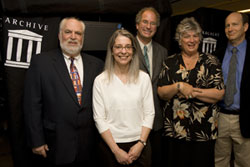 |

For further information, contact the MBL Communications Office at (508) 289-7423 or e-mail us at comm@mbl.edu
For Release: October 17, 2007
Contact: Gina Hebert, MBL, 508-289-7725; ghebert@mbl.edu
Scanned in Boston: Natural History Literature Coming to the Web
 |
|
 |
Resources:
External Links:
Photos:

Click for high-resolution version
NE Digitization Center.jpg: Celebrating the opening of the Northeast Regional Digitization Center at the Boston Public Library on September 20, 2007 are, left to right, Bernard A. Margolis, president, Boston Public Library; Judith A. Warnement, director, Harvard University Botany Libraries; Brewster Kahle, chairman, Internet Archive; Catherine N. Norton, director, MBLWHOI Library and deputy director, Bioheritage Diversity Library; and Doran Weber, program director, Alfred P. Sloan Foundation.

Frontispiece to The Standard Natural History by John Sterling Kingsley, published in 1884-85 by S.E. Cassino and Company, Boston. This book is part of the growing, online archive of biodiversity literature being built by the Biodiversity Heritage Library consortium.
|
BOSTON – Thousands of books are being scanned in Boston as part of a massive effort to digitize and make freely available more than two million volumes of literature on the world’s species.
The Biodiversity Heritage Library (BHL), a consortium of ten major libraries, plans to scan 1 million volumes of biodiversity literature over the next five years. This trove of information will support the Encyclopedia of Life project, a global initiative that will create a Web page for each of the 1.8 million species on Earth.
The Northeast Regional Scanning Center, which some of the BHL member libraries are using, opened September 20 at the Boston Public Library. Other scanning centers are being set up in Washington, New York, Chicago, and London.
“We are underway, we are doing it!” says Cathy Norton, deputy director of the BHL and director of the MBLWHOI Library in Woods Hole, which is sending off 1,000 volumes a month to Boston for scanning. “Ninety percent of the information on biodiversity is in these ten great libraries, yet 90 percent of the world’s biodiversity is in Africa and South America, where they don’t have access to this literature. Once we get the bulk of it up and online, this will be a great common good for the entire world via Internet access. It’s the right thing to do.”
The scanned literature will be freely available through the Internet Archive, a nonprofit group dedicated to building and maintaining an online, open-access, public-domain library and archive of texts, video, music, and other audio material.
This open-access approach is in contrast to large-scale scanning projects by Google and Microsoft, which put restrictions on access to the material they scan.
“For the first time in history, the core of our natural history and herbaria library collections will be available to a truly global audience,” Norton says.
The ten members of the Biodiversity Heritage Library are: American Museum of Natural History (New York); The Field Museum (Chicago); Harvard University Botany Libraries (Cambridge, Mass.); Harvard University, Ernst Mayr Library of the Museum of Comparative Zoology (Cambridge, Mass.); Marine Biological Laboratory/Woods Hole Oceanographic Institution Library (MBLWHOI Library) (Woods Hole, Mass.); Missouri Botanical Garden (St. Louis); Natural History Museum (London); The New York Botanical Garden (New York); Royal Botanic Garden, Kew (Richmond, U.K.); and Smithsonian Institution Libraries (Washington).
The BHL digitization project is funded by the John D. and Catherine T. MacArthur Foundation and the Alfred P. Sloan Foundation, which are also major sponsors of the Encyclopedia of Life.
The BHL is presently scanning materials that are out of copyright and in the public domain (in the United States, anything published before 1923).
“The important thing is, to classify a species, taxonomists have to go to the first time it was cited and described. And about 60 percent of the currently described species appear in pre-1923 natural history literature,” explains Norton. “So this is important information we can get our hands around. If we were to try and digitize information on molecular biology, it would be much more difficult, because that’s a new field. We wouldn’t have rights to those publications because most of them aren’t out of copyright.”
Because the name of a species can change over time, the BHL uses a specialized search engine that allows a visitor to pull up all of the literature on a certain species, regardless of which historic name is entered in the search box. This “taxonomic intelligence”-based search algorithm was originally developed at the MBLWHOI Library’s uBio project, funded by the Andrew W. Mellon Foundation.
In addition to its partnership with the BHL, the Northeast Regional Digitization Center is partnering with the Boston Library Consortium, a group of 19 academic and research libraries in New England, to build a digital archive of a wide range of literature.
“Fortunately, many great libraries are weighing the alternatives and choosing to go open instead of putting public domain material under perpetual restrictions,” says Brewster Kahle, digital librarian and founder of the Internet Archive.
The MBL is a leading international, independent, nonprofit institution dedicated to discovery and to improving the human condition through creative research and education in the biological, biomedical and environmental sciences. Founded in 1888 as the Marine Biological Laboratory, the MBL is the oldest private marine laboratory in the Western Hemisphere. For more information, visit www.MBL.edu.
|